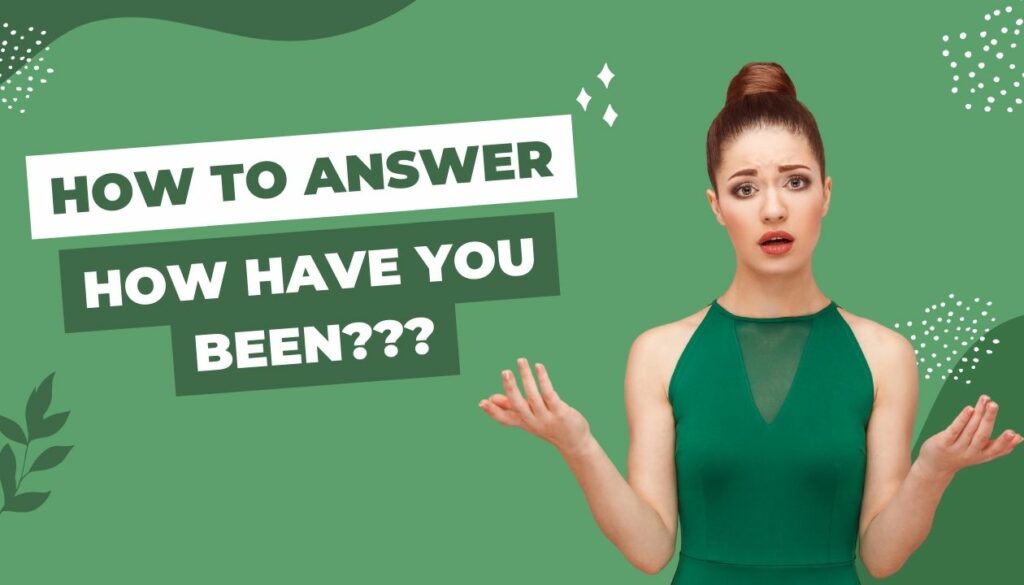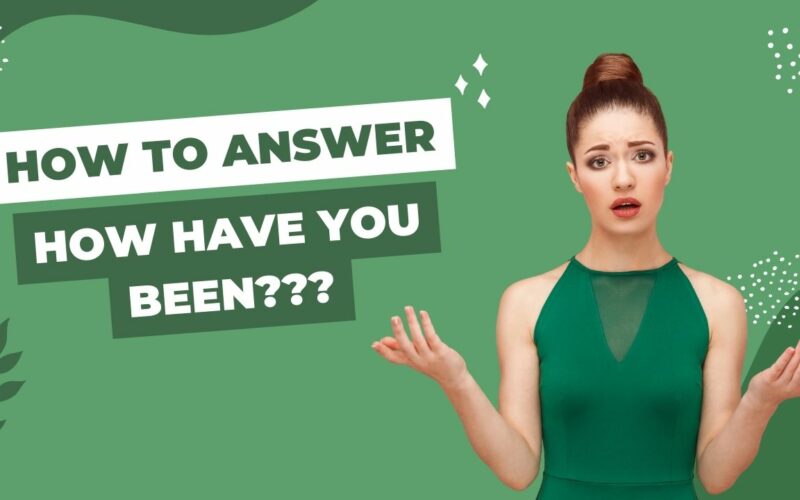In every interview or conversation, English speakers frequently ask, “How have you been?” It is a question about your activities and how your life has been since a specific time.
Maybe they're asking you how you've been doing since you last saw each other. Alternately, perhaps since the last time you spoke to me on the phone. Or maybe it has been since you prior exchanged private messages online.

How Often Should You Ask, “How Have You Been?”
But first, let's discuss when to utilise or when to ask this question before we discuss how to respond. There are initially two considerations:
- First, you should ask this question only if you've met the person.
- Second, only approach them if you haven't seen each other in a while (like a week or longer).
Most importantly, keep in mind that this is not a question to ask someone you recently met or last saw. The duration of time since you last saw that individual is the main topic of the query.
For instance:
- “How have you been since high school?”
- “How have you been since being admitted to the hospital last month?”
- “How has she been after the death of her parents?”
- “How is he doing now that they're over?”
Short Responses to How Have You Been?
Giving brief or one-word responses is one approach to responding to this inquiry. Usually, while you are having informal discussions, this happens. When speaking with other people, native English speakers frequently react in this manner. Here are some illustrations of succinct responses:
- “Good!”
- “Great!”
- “Not too bad!”
- “Never better, I say!”
- “Could be improved.”
- “A little not well!”
- “Hectic!”
- “busy”
- “As usual”
More Extended Responses to The Question
There is, of course, a more comprehensive way to respond to this query. It's comparable to responding to the inquiry “How are you?” as I indicated previously. The distinction is that you respond to the question “how are you?” in the present tense, like “I'm fine.”
On the other hand, when someone asks, “how have you been?” you will respond in the present perfect progressive tense. And “I have been” combined with the continuous verb form is used to accomplish this.
The present perfect progressive tense indicates an action that started in the past is still happening today and might even happen tomorrow. Here are a few instances:
How have you been?
- “I have been working a lot.”
- Since our last meeting at Christmas last year, “I've been travelling quite a bit.”
- I've been studying a little too hard, I realise now. I require a rest.
How has he/she been?
- Rahul has a lot of practice in the kitchen.
- Well, I see he's been going to the gym a lot.
- Drew has been lending a hand to neighbourhood children.
How Have You Been? More Ways to Respond
Is there more than one way to respond to this query? They do, for sure!
You may employ a verb's continuous form in your phrase. Simply adding the suffix “-ing” will improve the sound of your statement and provide the other person with more details about how you have been.
Please give more examples!
- Recently, I've been in excellent health.
- I've been busy at work.
- I've been sleeping a lot. Lately, I see.
- Recently, I've been studying a lot.
Is “How Have You Been” an Official or Informal Greeting?
Although not precisely formal, this query isn't casual either. You can put that question to someone you know well in a formal environment. Keep formal greetings to “how are you?” if you don't see the person.
In terms of register, saying “how have you been” is a polite approach to inquire about someone's life in great detail without being overt.
The person can and will open up and disclose such information if they choose to. The respondent has the option of giving a brief response to avoid revealing too much personal information.
Also read: How to Answer “What Do You Do”?
How Have You Been? and How Are You? Different Phrases
With anyone, from someone we've just met to someone we've known our entire lives, we can utilise the phrase “how are you?” When we see someone we see every day or someone we haven't seen in a while, we can use the word “how are you?” How are you, as in, how are you now, this very second?
Only people we know and haven't seen in a while can ask, “How have you been?” It is a polite way of inquiring about how you have been doing since our last conversation.
It demonstrates a genuine want to learn more about you than “how are you right now?” When we ask someone, “How have you been?” we request more details about their life.
Good or bad? Enquires about a person's present condition, while “how have you been” enquires about their lives recently and generally.
Also read: Most Common Interview Questions and Answers for Freshers & Experienced.
How have you been?
“I've done very well; how about you?”
If all you want to say is that you're doing well and don't feel like conversing, this is a good response.
“I've been working, studying, and running a lot lately, so I feel very worn out today.”
If you feel like discussing your current lifestyle and how that influences how you think, you can use this response. This is a relatively typical response to this query. How have you been? It is a request to share more about your life. If you're in good health, you can describe your deeds in the present perfect continuous and your feelings in the present simple.
Never have I been better!
This favourable response enables you to convey something new that has occurred in your life. The situation has been so good that I was able to get a new job. Responding to this question by discussing recent developments in your life is okay.
Oh, you didn't hear? I spent a week ill with the flu.
You can use the past simple when something happened in the past and is now over. I frequently respond to questions on the present perfect by using the past simple. Consider whether the problem is over. The use of the past simple in this instance makes it clear that although you were ill, you are now feeling better.
Ah, nothing to complain about.
If you are uncomfortable speaking and are feeling shy, this is a go-to response to the inquiry. Although this is a decent English response, it doesn't allow the conversation to advance.








